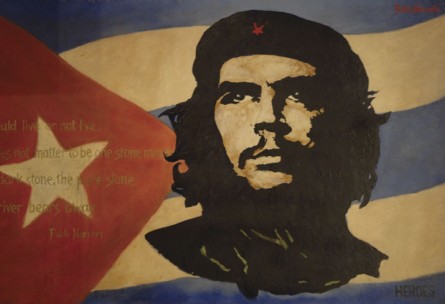Where to Stay
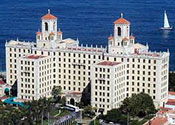 As an American, securing a hotel can be more difficult than getting a plane ticket to the island. Again, since you cannot use your credit cards nor wire money directly to Cuba, you’ll need to work through a 3rd party. If you have a Specific License, there are a few agencies in Florida that can assist you with securing a hotel; but you still must pay cash. If you don’t have a Specific License, then you’ll need to wire money to a 3rd party travel agency outside of the United States. Unless you personally know someone who has dealt with a Mexican/Canadian/Jamaican travel agent specifically on Cuban travel, this is not an option I’d feel comfortable doing. Many travel guides like Frommers and WikiTravel provide detailed information on hotels and their amenities, so I won’t regurgitate what’s already been said in more detail in those places. Just understand if you go the hotel route, it will likely be expensive and 4-5 star hotels you may be used to in the US aren’t the same as the Cuban versions.
As an American, securing a hotel can be more difficult than getting a plane ticket to the island. Again, since you cannot use your credit cards nor wire money directly to Cuba, you’ll need to work through a 3rd party. If you have a Specific License, there are a few agencies in Florida that can assist you with securing a hotel; but you still must pay cash. If you don’t have a Specific License, then you’ll need to wire money to a 3rd party travel agency outside of the United States. Unless you personally know someone who has dealt with a Mexican/Canadian/Jamaican travel agent specifically on Cuban travel, this is not an option I’d feel comfortable doing. Many travel guides like Frommers and WikiTravel provide detailed information on hotels and their amenities, so I won’t regurgitate what’s already been said in more detail in those places. Just understand if you go the hotel route, it will likely be expensive and 4-5 star hotels you may be used to in the US aren’t the same as the Cuban versions.
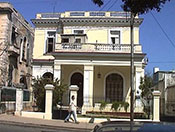 An alternative (and perhaps better) housing option is to stay in a Casa Particular – similar to a Bed & Breakfast in the US. Legal Casa Particulares (Spanish for “Private House”) have been legally granted the right by the Cuban government to rent one or more rooms in their homes to tourists. There are illegal Casas (those attempting to make money without paying the required government taxes), but I would strongly advise against using those for your and the owner’s sakes. Depending on the Casa, you may have a choice of bed types (twin, double, king), in room TV, private bathroom, etc. Rates per night range from 15 CUC to 60 CUC (1 CUC = .90 USD) a night depending on the location, type of room and amenities. Many Casa owners will cook breakfast and/or dinner for a nominal fee, though be sure to negotiate/understand this prior to reserving.
An alternative (and perhaps better) housing option is to stay in a Casa Particular – similar to a Bed & Breakfast in the US. Legal Casa Particulares (Spanish for “Private House”) have been legally granted the right by the Cuban government to rent one or more rooms in their homes to tourists. There are illegal Casas (those attempting to make money without paying the required government taxes), but I would strongly advise against using those for your and the owner’s sakes. Depending on the Casa, you may have a choice of bed types (twin, double, king), in room TV, private bathroom, etc. Rates per night range from 15 CUC to 60 CUC (1 CUC = .90 USD) a night depending on the location, type of room and amenities. Many Casa owners will cook breakfast and/or dinner for a nominal fee, though be sure to negotiate/understand this prior to reserving.
To me, there are several advantages to staying in a Casa Particular instead of a hotel:
- Assuming you are dealing directly with the Casa owner, there is no need to prepay for your stay – avoiding the issues with reserving a hotel. The process is fairly straight forward; you contact owner via email/website and ask for pricing/availability, owner responds via email with rate and pictures of a specific room, you both confirm the reservation and you show up and pay cash. Easy!
- You will get to know the “real” Cuba; at least one side of it. Cubans are unlikely to discuss matters of politics in public – but are usually more than happy to do so in their homes. While this view is certainly from the perspective of the privileged few who own their homes, it is certainly a personal perspective you are unlikely to receive at any hotel.
- Locals are generally not allowed inside of your hotel room in Cuba (an alarming trend in Latin America). This may or may not be an issue for you, but if you are traveling alone and hope to get ‘lucky’ – it won’t happen without a little grease to the doorman in your hotel. Guests are generally accepted in Casas, especially those with private entries.
- Generally speaking, restaurant food in Cuba is fairly bland because spices we take for granted (like pepper) are in short supply due to the high cost of importing. This is a non-issue in a Casa; as spices are purchased in much smaller quantities and are distributed to much fewer people. Besides, where in the world is home cooking not better than restaurant cooking???
- You are contributing directly to into the well being of the person you are staying with. Some Casa owners derive their entire income from their rentals, others use their rentals as secondary income. Either way, you are directly increasing their standard of living.
- Casas are a hell of a lot cheaper than staying in a hotel. Casas prices run anywhere from 15-60 CUC per night, while hotels run from 60-300 CUC per night. Hotels don’t necessarily have better rooms/amenities nor are they necessarily in better neighborhoods.
Note: Many Casa Particular owners do not speak English, so you’ll need to account for this while you are making your reservation.
What to Expect Once You Arrive
Once you’ve successfully conquered the maze of obstacles necessary to set foot on the island, there are a few things you should keep in mind during your stay (in no particular order).
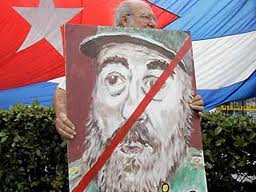 Don’t talk politics or anything disparaging about the Castros or the government in public. There are uniformed, secret police and informers all around. You saying something bad about Castro or the government might get you a trip to the local station, but the consequences could be far worse for any Cuban you are having this conversation with. If you want to know what the people really think, go to their homes (which is why I suggest staying in Casa). Once away from prying eyes/ears – most Cubans will tell you how they think and what they go through on a daily basis.
Don’t talk politics or anything disparaging about the Castros or the government in public. There are uniformed, secret police and informers all around. You saying something bad about Castro or the government might get you a trip to the local station, but the consequences could be far worse for any Cuban you are having this conversation with. If you want to know what the people really think, go to their homes (which is why I suggest staying in Casa). Once away from prying eyes/ears – most Cubans will tell you how they think and what they go through on a daily basis.- Don’t start nothing, won’t be nothing! You are not in the United States of America; therefore our laws do not apply. In the US, you have bail, the right to an attorney, due process, a right to know the charges against you and a right not incriminate yourself. In Cuba – maybe. Furthermore, there isn’t a US embassy in Cuba to help you should you find yourself in a sticky situation; you will essentially be on your own. Take this guy; I have no idea whether he is a spy or not – what I do know is he’s been sitting in a Havana jail for almost a year with no formal charges and no sign of leaving any time soon. To be clear, his experience isn’t necessarily indicative of the average traveler, but the point is jail is the last place you want to be in Cuba. Don’t increase your chances of an unplanned extended vacation by acting like the so-called ‘Ugly American’. Cuba is not for Bitches! You have been warned.
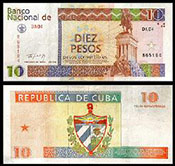 Cuba is very, very expensive for foreigners, even more so for US citizens. There is a dual currency in place that makes it one of the more expensive destinations in the hemisphere (something I’ll elaborate on further in Part 3). There is also a 10% surcharge to exchange US dollars making it even more expensive. The fact that you have to use ‘real money’ only compounds the issue (your US credit/debit cards won’t work in Cuba).
Cuba is very, very expensive for foreigners, even more so for US citizens. There is a dual currency in place that makes it one of the more expensive destinations in the hemisphere (something I’ll elaborate on further in Part 3). There is also a 10% surcharge to exchange US dollars making it even more expensive. The fact that you have to use ‘real money’ only compounds the issue (your US credit/debit cards won’t work in Cuba).- You must budget accordingly; if you run out of money you are royally screwed. No ATM in Cuba will work with credit/debit cards issued by any US bank or its foreign subsidiaries. As soon as you land in Havana, put aside your ‘get out of dodge’ stash which should include your return cab fare (20-30 CUC) and the mandatory departure tax (25 CUC). Separate this stash from the rest of your money to ensure you don’t accidentally spend/lose your only means of leaving the island.
- If you do run out of money and/or get into trouble, you can contact the US Special Interest Section in Havana for assistance. Because it is not a true embassy, they cannot guarantee assistance commonly given in other countries (like access to attorney); though they may be able to assist you in wiring jail/fine money from a relative. If you are in Cuba illegally, contacting the US government for assistance during your trip will likely be “awkward” to say the least. I would imagine the awkwardness with US Customs will continue long after you’ve successfully left the island.
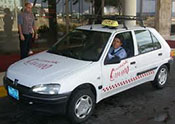 Get a metered taxi – they are almost always cheaper than a negotiated fare. Metered taxis are quite cheap in Havana so if there is an option, insist on a metered taxi. Furthermore, insist that the meter is actually used during your trip. Frequently when you ask for the meter to be turned on, the taxi driver will simply quote a price. Of course this price is always more – sometimes negligibly higher other times double. If you have to get a non-metered taxi – get your negotiating skills together. When the cabbie quotes you a price – assume the quoted price is 20% over what you would have paid on a metered run and counter. If you are staying in a Casa, the locals should be able to tell you how much a taxi will cost.
Get a metered taxi – they are almost always cheaper than a negotiated fare. Metered taxis are quite cheap in Havana so if there is an option, insist on a metered taxi. Furthermore, insist that the meter is actually used during your trip. Frequently when you ask for the meter to be turned on, the taxi driver will simply quote a price. Of course this price is always more – sometimes negligibly higher other times double. If you have to get a non-metered taxi – get your negotiating skills together. When the cabbie quotes you a price – assume the quoted price is 20% over what you would have paid on a metered run and counter. If you are staying in a Casa, the locals should be able to tell you how much a taxi will cost.- Always carry a copy of the front inside cover of your passport – both pages. Do not carry your actual passport – store it in a safe place along with your get outta dodge money. While this is good advice no matter where you travel outside of the US, it’s even more important in Cuba to always have identification on your person (copy) and be able to get out of the country (don’t lose the original).
- You will be safe in Cuba – safer than in any country I can think of in North America. Sure, a vendor or cab driver will try to hustle you, but armed robbery or murder – not a chance. Illegal drugs – cocaine, marijuana, Meth, etc. are also not prevalent in Cuba – further decreasing the crime rate. If there was ever a so-called benefit of a near police state – low crime rates is it. Don’t take pictures of the police unless you ask permission first – seriously!
- Most importantly, whether you are in Cuba for business, research or pleasure – enjoy yourself! Have a pleasant attitude, deal with shortages/unavailability and understand 1st class on the island is a little different than back home. I reiterate, Cuba is not for Bitches!!!
…Continued






